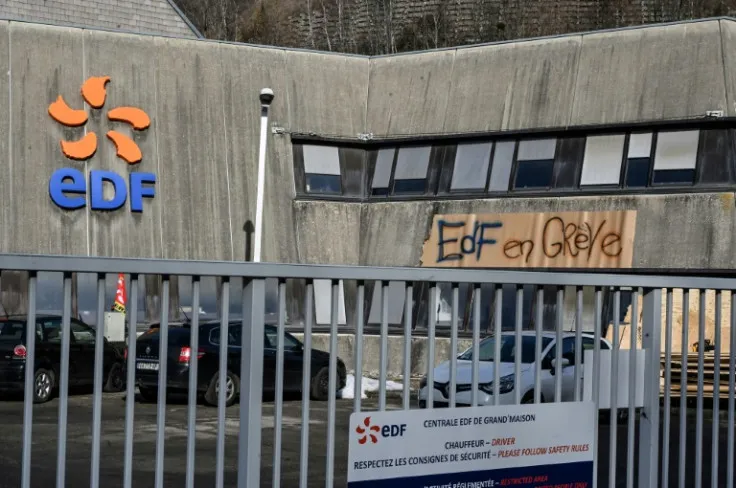 Newly appointed EDF CEO Luc Remont announced a record net loss of €17.9bn euros ($19bn) in 2022, but pledged to put the company back on track. Électricité de France (EDF) posted a loss before interest, tax, depreciation and amortisation (Ebitda) of €4.99bn, compared with positive Ebitda of €18bn in 2021. The company's net financial debt increased 50% in 2022 to €64.5bn up from €43bn the previous year. “The 2022 results were significantly affected by the decline in our electricity output, and also by exceptional regulatory measures introduced in France in difficult market conditions,” Rémont said.
Newly appointed EDF CEO Luc Remont announced a record net loss of €17.9bn euros ($19bn) in 2022, but pledged to put the company back on track. Électricité de France (EDF) posted a loss before interest, tax, depreciation and amortisation (Ebitda) of €4.99bn, compared with positive Ebitda of €18bn in 2021. The company's net financial debt increased 50% in 2022 to €64.5bn up from €43bn the previous year. “The 2022 results were significantly affected by the decline in our electricity output, and also by exceptional regulatory measures introduced in France in difficult market conditions,” Rémont said.
Nuclear output fell to a 34-year low as a result of plant closures due to corrosion problems identified in 2021 and strikes by workers demanding pay increases and protesting pension reform plans. Half of EDF’s 56 reactors were offline for maintenance in 2022 with repairs delayed due to the Covid pandemic. This cost EDF €29.1bn in repairs. Some 16 reactors were identified as most affected by stress corrosion issues (four N4-series 1450 MWe reactors and 12 P4-series 1300 MWe reactors). Corrosion problems have been, or are being, treated at 10 of these and pipes will be replaced at seven more by the end of 2023.
As to strikes, in a single night recently, striking workers caused a drop in output of 3,000 MWe, the equivalent of production at three nuclear reactors. "We're ready to shut France down," energy union leader Fabrice Coudour told AFP ahead of a major protest day scheduled for 7 March.
The overall fall in output has forced EDF to buy electricity on the market to supply its customers at a time when sanctions on Russian energy had pushed up prices. At the same time, government measures to fight inflation capped the increase in electricity bills for French households.
Another major factor is EDF’s obligation to sell a quarter of its production at a fixed price to its competitors. The system known as Arenh (Regulated Access to Historic Nuclear Electricity) was devised in 2010 at the behest of the EU, which sought to prevent France becoming a monopoly provider. While this opened the French electricity market to competition, EDF says it forced the company into the absurd situation of subsidising its competitors.
In January 2022 the government decided to increase the amount of electricity that had to be sold through the Arenh mechanism. As a result, in August, EDF launched a legal claim against the government for more than €8bn in lost earnings. According to the BBC, three former CEOs have described the Arenh system as "a poison pill" and accuse the EU and Germany of rigging the system against France's interests. In 2022 things became "surreal" according to one former CEO. EDF was having to buy in electricity at €100 a unit, and sell it to rivals at €46.
“Today, our priority is to put EDF back on track," Remont told reporters. Core earnings for this year are expected to be "significantly higher" than the €18bn reported in 2021, he said, and the group targets net debt at three times Ebitda or less in 2023. He targeted nuclear output in France of 300-330 TWh in 2023, up from 279 TWh in 2022. This was the lowest since 1988, resulting in France becoming a net importer of electricity for the first time since 1980.
However, EDF has to fund big investments of €33bn on its existing reactors by 2028, while plans to build six new reactors by 2050 is expected to cost €52bn. In addition, the company expects a bill of several billion euros for the construction of the planned Sizewell C NPP in the UK.
Meanwhile, the EPR under construction at unit 3 of the Flamanville NPP is more than 10 years behind schedule and its estimated cost has more than quadrupled to €13.2bn. At the end of 2022, EDF had to announce a further six-month delay to Flamanville-3. Cost overruns and delays have also been experienced by similar projects at EPRs under construction at the Olkiluoto NPP in Finland, Hinkley Point in the UK and the Taishan NPP in China.
The French government, which had an 84% stake in EDF, has increased its stake via a public tender offer to 95.82% of shares and 96.53% of voting rights. The tender offer is expected ti reopen in an attempt by the state to take 100% control. However, EDF said the plans are on hold pending a court ruling on an appeal by minority shareholders. The ruling is expected in the first half of 2023. The government has given Remont six months to come up with a strategic plan for EDF.
"EDF's financial recovery will most of all require an increase in production," Finance Minister Bruno Le Maire and Ecological Transition Minister Agnes Pannier-Runacher said in a joint statement after the results were announced. They called on Remont to "prepare the project of new EPRs decided by the president". In February 2022, President Emmanuel Macron called for a nuclear "renaissance" that would see up to 14 new reactors in France based on new-generation EPR-2s.






